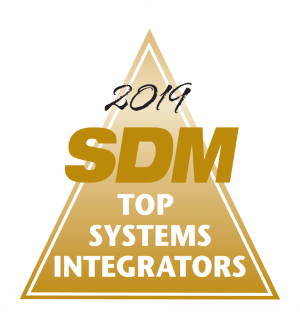How to do more with fewer resources? How to serve new types of customers, enter new lines of business or simply add more devices to installations? All security dealers have questions such as these — and as they ponder them, one of the best places to turn for answers may be their equipment distributor.
HOW CAN I DO MORE WITH LESS?
Whether dealers are experiencing a profit squeeze from increased competition or simply having trouble finding skilled labor, their equipment distributor may be able to help.
For dealers looking to keep headcount to a minimum, distributors offer a range of options that can make operations more efficient.
For example, Hickory, N.C.-based distributor The Systems Depot has a daily delivery route around its distribution centers, eliminating the need for technicians to take time out of their day to go to the distribution center to pick up equipment.
Dealers can get equipment delivered the next day at no charge or get it the same day for a fee if they order by 8:30 a.m., explains Michael Lingle, marketing manager for The Systems Depot.
Another time saver comes from ScanSource, which offers what the company calls SNAP tools to help expedite the process of selecting the right equipment for a job. The Greenville, S.C.-based distributor recently expanded its SNAP tool offerings, developed in house, and now has tools available for video surveillance, access control and wired and wireless networking, explains Christie Hamberis, senior vice president of ScanSource Networking and Security.
In the case of security cameras, for example, “a technician could use a desktop or mobile app to access built-in directories to help calculate field of view, bandwidth, storage and voltage requirements — the functionality is extremely simple and fast,” Hamberis comments.
ScanSource and some other distributors also offer configuration services, minimizing the amount of time a dealer’s technicians must spend programming equipment.
WHAT IF I NEED SKILLS MY PEOPLE DON’T HAVE?
Sometimes a distributor can help fill in gaps in dealer skill sets or augment those skill sets.
For example, technicians at Westwood, Mass.-based distributor Security Lock Distributors Inc. will do what Michael Clebnik, executive director- sales & partnerships for Security Lock Distributors, calls a “virtual walk through” of a prospective job site with a dealer’s technicians, using modern videoconferencing tools to help in selecting the right equipment for a job.
“We help them with the door hardware component,” Clebnik comments. “We’re literally walking the job with them.”
Meanwhile, Mahwah, N.J.-based distributor eDist Security can eliminate or minimize the need for dealer marketing staff. eDist has a sister company that specializes in marketing and dealers can earn marketing credits equal to 2 percent of what they spend on certain vendors. Dealers can accumulate in a portal and spend with the sister company, explains Nick Scarane, eDist Security president.
A wide range of marketing support is available, including social media, email blasts, door hangers, van wrappers and more, he notes.
If a dealer can’t find technicians with certain types of experience, an obvious solution is to train existing staffers — and distributors can be a big help in that regard.
Access Hardware Supply, for example, has seen strong demand for training on basic electronic relays.
“We teach basic troubleshooting so people can be confident that, yes a part is bad and the part they’re ordering is actually needed,” explains Bill Smoyer, western regional sales manager for the San Leandro, Calif.-based distributor.
That training was created by Access Hardware and is vendor-neutral, but dealers also may find training on a wide range of topics provided by manufacturers’ representatives scheduled for a distributor location at certain dates and times. Some distributors say IP networking is a particularly hot training topic.
I NEED TO FIND NEW LINES OF BUSINESS
In search of new revenues, dealers may consider getting into new lines of business — and here, too, a distributor can help.
ScanSource, for example, offers what the company calls “FastPath” training for several manufacturers. As a dealer looks to get into a new line, technicians can quickly get up to speed on those manufacturers by taking the FastPath training, Hamberis explains.
Glenview, Ill.-based distributor Anixter has been seeing more security dealers wanting to get into professional audio visual, observes Matt Powers, Anixter vice president of global technology services. Another hot area is providing city-wide wireless systems, Powers notes.
To help dealers learn about new technologies such as these, Anixter invites dealers to one of its four briefing centers nationwide, two of which were opened just this year.
Increasingly, dealers also are looking at providing security systems for business customers that have locations in multiple countries, notes James Rothstein, Anixter senior vice president of global security marketing.
Dealers’ multi-national business customers “are looking for standards across their business,” Rothstein says. Anixter has locations around the world, putting the company in a good position to serve those customers, he observes.
Another new business that dealers may be interested in but may want help on is the do-it-yourself (DIY) market. eDist Security offers a tailored program for those dealers that includes creating customized kits with the equipment the dealer wants to support and shipping them directly to the end user, Scarane explains.
Dealers offering self-installed systems view it as a means of getting ongoing monthly monitoring revenue, he notes.
CAN YOU HELP ME FIND NEW CUSTOMERS?
Another way distributors may be able to help dealers is by helping them identify potential new customers. For example, Fremont, Calif.-based distributor Synnex Corporation keeps track of public sector purchase requests, including those from the General Services Administration, for IT, audio visual and security equipment, which can be an excellent source of leads for the company’s dealer customers.
Synnex also gives dealers the opportunity to learn about specific vertical markets at its “Red, White & You” road shows, which include workshops, breakouts, and a vendor pavilion as well as networking opportunities.
And for dealers that would like to take on bigger projects but are concerned they might be too big, Synnex offers the RISE program. That program provides equipment financing for those dealers that might not have sufficient cash on hand to purchase the equipment needed for a major job.
AM I TAKING FULL ADVANTAGE OF DISTRIBUTOR RESOURCES?
Clearly any security dealer that views its distributor as simply a provider of equipment is missing out on some potentially valuable opportunities. Whether a dealer needs help with training, making operations more efficient or in pursuit of new lines of business and new types of customers, the company’s distributor can be an excellent place to find that help.
Distributor Helps Secure Security Equipment
Some distributors help dealers operate more efficiently by sending equipment directly to a job site, even staging orders so that equipment arrives as it is needed. But that service may raise a new issue — protecting the equipment delivered to a jobsite from theft.
Anixter has a novel means of addressing that concern. The company can deliver equipment in what Greg Tilger, Anixter vice president of global marketing for channel and supply chain solutions, calls a “shark cage” — a locked metal cage surrounding equipment packed on a pallet. If desired, dealer personnel can use a forklift to move the pallet to a more secure location.
Anixter also can use a distinctive color of shrink wrap, making the equipment easier to find after it is delivered.
Distributor Benefits Quantified
ScanSource provided details about the time and money a dealer can save by using the ScanSource Custom Configuration Center:
-
Utilizing a fully burdened technician costs $30-$60+/hour based on geography and skill level.
-
Under ideal conditions (in the ScanSource CCC lab), the setting of an IP address and labeling of a camera requires the following amount of time:
-
1 camera = 5 minutes/camera
-
10+ cameras = 3 minutes/camera
-
Using the CCC, resellers’ resources can be applied to other, more profitable functions.
-
May eliminate having dedicated configuration space at dealer location.
-
DOA/defective issues almost completely eliminated for additional cost savings in reduced truck rolls.
-
Reduced packaging and fully labeled product increases deployment efficiency and improves quality.
-
Cash flow improved as fully configured products arrive ready for installation (invoice generated once product is shipped fully configured).
IP Training Options
Training on Internet protocol (IP), along with devices and networks that use IP for communications, was once the exclusive purview of information technology (IT) specialists — but no more.
As more and more elements of security systems use IP communications and as security dealers branch into new lines of business, dealers need to understand IP networking.
Distributors can play a major role in ensuring dealers get the IP education they need.
The Systems Depot has seen the turnout for some types of manufacturer-provided training decrease in recent years, perhaps because dealer personnel have more limited time for training. The exception, according to The Systems Depot’s Michael Lingle, is IP training, which he can generally count on to be a big draw.
“We seem to see an increase in training participation when there is any type of IP instruction,” Lingle comments.
One of The Systems Depot product managers, Tom Channel, created vendor-neutral IP training that has been particularly popular. “We included everything from how to set up a network to how to put a connector on a Category 5 cable,” he says.
Other examples of vendor-neutral IP training come from ADI, Ingram Micro, and ScanSource.
SDM Technology Writer David Engebretson has been offering IP training at ADI Expos around the U.S. and Canada for several years. This year’s training covers how to best utilize twisted pair, coax, fiber and other cabling methods to achieve high-bandwidth connectivity and includes demonstrations of the latest methods, testing devices and termination techniques, according to ADI. Cybersecurity and network security practices for technicians installing Internet of Things devices are also among this year’s topics.
IP technology is included in the Grad Program that Ingram Micro developed that includes a library of content in the distributor’s self-guided learning program. This gives dealers “the fundamental knowledge that supports any connected device no matter from which vendor the device comes,” observes Nina Buik, senior principal business development and marketing management, professional and training services for Ingram Micro.
ScanSource’s IP training options include materials developed in-house and provide “web seminars, on-demand videos, in-person training and certification classes and high-level technical support to ensure our partners are ready not only to sell their IP solutions but also to provide insight to their end-user customers, who may need their advice on what solutions to install,” comments Christie Hamberis, ScanSource.
Hamberis had a bit of a contrarian take on the demand for IP training, however, noting that demand for it is not growing as fast as for solutions training in general.
“We see general IP training moving more to requests around specific solutions-type training,” Hamberis comments. “For example, we might be asked to help train around a broad solution like the Internet of Things or more specifically a solution like network-based access control.”
Meanwhile eDist sees IP training as part of broader training requirements, which the distributor addresses in large part through its multi-purpose room that is dedicated to product application demonstrations, IP video dealer training, webinars and occasionally end user presentations for the dealer’s customer. “The room is also heavily utilized internally for new product testing as a way to ‘kick the tires,’ along with conducting camera/ NVR compatibility testing before we introduce those products to our reseller network,” comments Mike Weinstein, IP channel manager – Security Division for eDist. “Much of the dealer training we conduct is one-on-one pre-sale reviewing specific product, along with programming and deployment.”
Cybersecurity: A Growing Concern for Security Dealers
As IP networking becomes increasingly important to security dealers, it’s becoming increasingly important for dealers to learn more about another topic as well — cybersecurity.
“The lines have become blurred between physical and cybersecurity,” observes Nina Buik, Ingram Micro Inc. As more and more physical security devices are network-connected, “if there is an attack on the system, it could bring down physical security,” she explains.
To help protect dealers and their customers against cyberthreats, Ingram Micro offers services such as penetration testing and social engineering designed to identify potential vulnerabilities so they can be addressed. A social engineering test, for example, might involve sending the test organization’s employees an email purported to be from the organization’s CEO but that actually is from a suspicious sender and contains a virus.
The security industry also needs to understand the potential dangers in end-of-life equipment, defined as equipment that is no longer supported by the company that made it, Buik notes. Because such equipment does not receive security updates, it can become vulnerable to cyberattack.
Ingram Micro customers recently had the opportunity to learn about cybersecurity at an online event, dubbed FIT LIVE, that gave each attendee an avatar that could walk around in a virtual environment, take a seat at a presentation by clicking on it and subsequently see the presenter from that point of view or even kick a virtual ball around on a beach.
Despite the threat, cybersecurity also creates new opportunities for security dealers, notes Sandi Stambaugh, vice president of product management for Synnex Corporation. She cites the example of Synnex’s penetration testing and firewall-as-a-service offerings.








